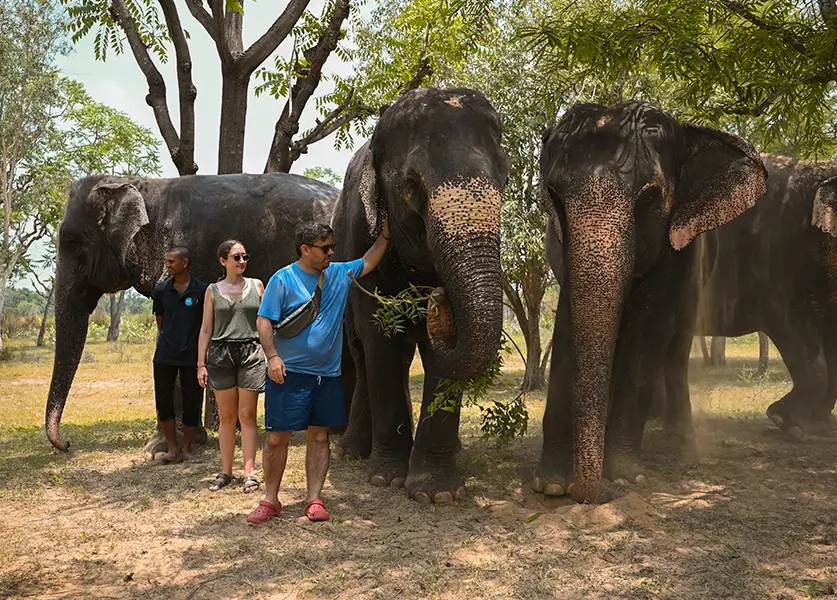
In recent years, the conversation around wildlife tourism in India has taken a much-needed shift. Tourists are becoming more conscious about the choices they make, especially when it comes to interacting with animals. One of the most debated topics is elephant riding — an activity that was once marketed as an exciting cultural experience. However, behind the scenes lies a story of cruelty, suffering, and lifelong trauma. This blog aims to shed light on why riding elephants is harmful, and why choosing ethical alternatives like Elefantastic in Jaipur is a more humane and fulfilling way to connect with these gentle giants.
Many travelers are unaware of the harsh reality that elephants go through before they are ever ridden by tourists. To make an elephant submissive enough for riding, it is subjected to a brutal training process known as "phajaan" or "breaking the spirit." This involves separating young elephants from their mothers, keeping them in isolation, using physical punishment, and denying them food and sleep for days. The goal is to crush the elephant's spirit until it becomes completely obedient.
Even after this painful process, the cruelty doesn’t end. Elephants used for rides are often kept in chains when not working, deprived of proper rest, and forced to work in extreme weather conditions. Their spines, not built to carry heavy loads, suffer long-term damage.
Aside from being unethical, riding elephants can also be dangerous for tourists. Elephants are wild animals, and even the most "tamed" ones can react unpredictably when they are stressed or abused. There have been several documented incidents of elephants running amok or attacking due to years of suppressed pain and trauma.
Moreover, tourists are often unaware of the health issues faced by these animals, including untreated wounds and infections. Sitting on an unhealthy elephant, especially one with spinal injuries, can worsen the animal's condition and put the rider at risk as well.
The good news is that ethical elephant tourism in India is growing, and Elefantastic in Jaipur is leading the way. Rather than offering elephant rides, Elefantastic promotes respectful and cruelty-free experiences that allow visitors to interact with elephants in a natural, stress-free environment.
At Elefantastic, visitors can:
This form of interaction builds a deeper emotional connection, making it an unforgettable and meaningful experience for tourists while ensuring the elephants live with dignity.
What many don’t know is that Elefantastic is not just an ethical sanctuary – it’s also a tour operator offering customized and immersive India travel experiences. From organizing private Golden Triangle Tours (Delhi-Agra-Jaipur) to luxury Rajasthan trips, Elefantastic ensures that your journey across India reflects compassion, culture, and comfort.
Whether you’re planning a honeymoon, a family vacation, or a cultural retreat, the team at Elefantastic can take care of your entire tour with:
More travelers today are choosing experiences that align with their values. Responsible tourism in India is not just a trend – it’s a growing movement. When you choose to visit ethical sanctuaries like Elefantastic and avoid riding elephants, you are directly contributing to animal welfare.
Social media has played a huge role in spreading awareness. Influencers, photographers, and wildlife lovers are sharing real stories about animal abuse in tourism and encouraging followers to make better choices. Being a part of this movement means you leave a positive impact while still enjoying all the beauty and culture India has to offer.
By supporting sanctuaries like Elefantastic, you're not just enjoying a trip – you're being a part of a movement that respects nature and uplifts communities.
Book your ethical elephant experience or customized India tour with Elefantastic!
Email: hello@elefantastic.in
Mobile / WhatsApp: +91-8094253150
Riding elephants is unethical because it involves abusive training methods, physical strain, and long-term psychological harm to the animal.
Phajaan, or "breaking the spirit," is a brutal training process where baby elephants are beaten, starved, and confined to make them submissive to humans.
They are often taken from their mothers at a young age, tied in chains, beaten repeatedly, and deprived of food and sleep to control them.
No, but they are discouraged. Many ethical sanctuaries and wildlife activists are campaigning to stop the practice due to cruelty involved.
Yes, elephants’ spines are not designed to carry heavy loads. Repeated riding can cause permanent spinal and internal injuries.
Look for places that don’t offer rides or performances, focus on education and care, and let elephants roam freely — like Elefantastic.
Ethical sanctuaries offer experiences like walking with elephants, feeding them, bathing, and learning about their behavior.
No. Elefantastic promotes ethical elephant tourism in India and strictly follows a no-riding policy.
Yes, ethical sanctuaries provide medical care, natural diets, open spaces, and mental stimulation.
Visitors can feed elephants, join bathing sessions, take nature walks, and learn from mahouts about elephant personalities.
Absolutely. You can feed them fresh fruits like bananas and sugarcane under supervision.
Yes. Many elephants at Elefantastic were rescued from temples, circuses, and tourist centers.
They are more relaxed, interactive, and show natural behavior like dust-bathing, socializing, and playful movements.
Yes, when guided by professionals and in a peaceful setting like Elefantastic.
It funds rescue and care, discourages abusive tourism, and creates awareness among global travelers.
By sharing their ethical experiences on social media, writing reviews, and educating friends and family.
Avoid any place offering rides, tricks, chains, or unnatural behavior in elephants.
Yes, Elefantastic offers family-friendly, safe, and educational programs for all ages.
It prioritizes elephant welfare, offers authentic, respectful interaction, and supports local communities.
Visit ethical sanctuaries like Elefantastic, donate, volunteer, or share your experience to promote change.